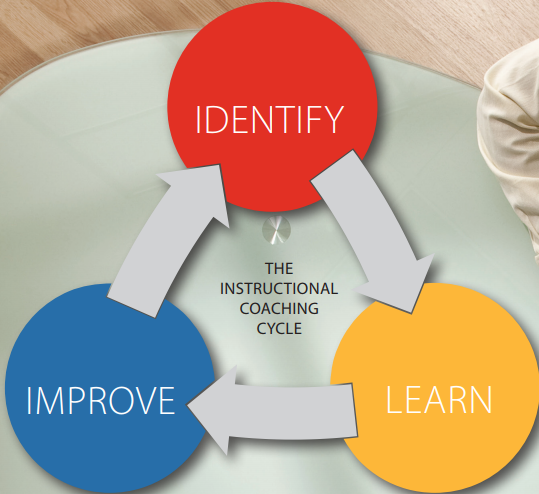Approaches to Professional Learning #3: Instructional Coaching
Like Reflective Practice, the idea of “coaching” is not unique to education professionals. The specific approach of “Instructional Coaching” has been championed by Jim Knight (see links below for references) to support the professional growth of teachers. It involves a designated “instructional coach” coming alongside individual teachers to help them…

- Identify a specific goal for improving their classroom practice, based on evidence collected in the classroom (videos of lessons, observations, student work)
- Learn new teaching approaches and strategies that will help them meet their goal.
- Improve their practice through on-going feedback and innovation as they work towards their goal.
These three elements can be viewed a cycle – once a teacher has met their goal the process starts again – but it can also be an iterative process, going back and forth between the elements as needed.
Another key idea in this approach is “teacher as decision-maker”. The teacher is viewed as a competent professional, capable of directing their own growth and improving their classroom practice. The instructional coach is a knowledgeable conversation partner – asking good questions, providing feedback and sharing resources. While the coach is proactively involved, the initiative and the decisions are taken by teacher.
What I like most about this approach:

- It is personal and relational, tailored to the specific needs of the individual teacher but does not leave them working in isolation.
- It is focused on increasing student learning. Goals are set based on evidence of student needs collected in the classroom.
- It would likely increase teachers’ sense of self-efficacy, as it empowers them to be agentic in their classrooms.
Some challenges I see with this approach:
- A high commitment of time and other resources. Schools would need to hire highly experienced and well trained coaches, and/or reduce the teaching load of their best teachers so that they can take up the role.
- Gaining teacher “buy in” could be difficult. Requiring teachers to work with an instructional coach could be seen as a slur on their reputation, but leaving coaching as optional could result in the coach not having much work to do! If teachers do not understand the approach it could easily be perceived as threatening. School leaders, and the coaches themselves, would need to do some clear and compelling “selling” of the idea.
- Some teachers may be hesitant to take on the role of decision-maker, expecting the coach to solve their problems for them. If the coach is too quick to present their suggestions and expertise, it could actually reduce teacher innovation and sense of self-efficacy rather than increase it.
To explore this approach more…
- Book: “The Impact Cycle” by Jim Knight
- Website: The Instructional Coaching Group – more books and other resources from Jim Knight.
- Resource from the Australian Institute for Teaching and School Leadership (Aitsl)
- Tools from “Solution Tree”
Comments